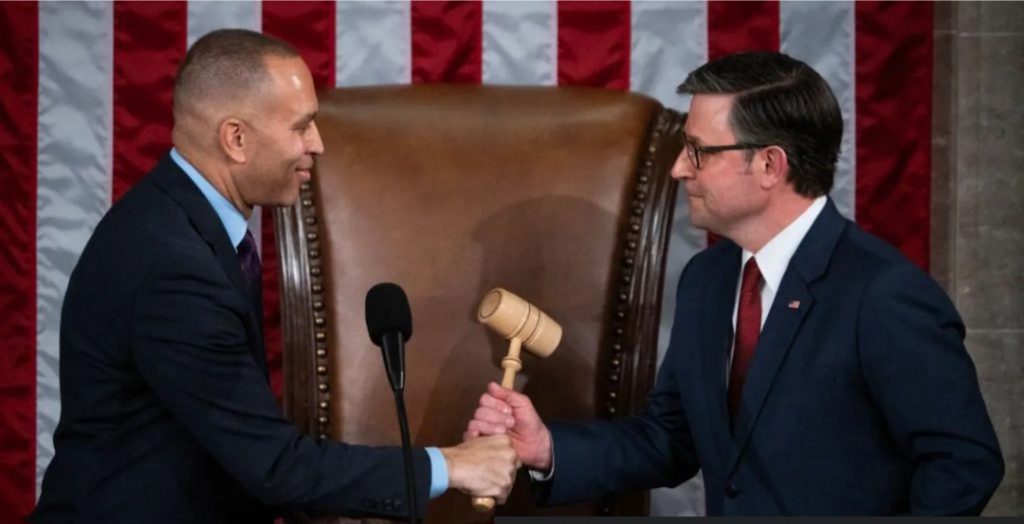
Crystal Dike
The United States Congress remains deadlocked over how to end the partial government shutdown, as lawmakers brace for another round of votes on Monday with no clear breakthrough in sight.
The shutdown, now entering its fifth day, has exposed deep divisions between Democrats and Republicans, primarily over healthcare funding. Democrats are pushing to preserve health insurance subsidies for low-income Americans and reverse cuts to Medicaid, while Republicans accuse them of inflating spending in a temporary funding bill.
In separate interviews on NBC’s Meet the Press on Sunday, House Democratic leader Hakeem Jeffries and Republican leader Mike Johnson each blamed the other’s party for the stalemate.
Jeffries accused Republicans of “lying” about Democrats’ intentions “because they’re losing the court of public opinion.” He said Democrats are fighting to protect healthcare benefits for working Americans, warning that failure to extend the Affordable Care Act tax credits would lead to “dramatically increased premiums, copays, and deductibles” for millions.
“We are standing up for the healthcare of hard-working American taxpayers,” Jeffries said, adding that Republicans have stopped communicating with Democrats and are “negotiating in bad faith.”
Johnson, meanwhile, insisted Democrats were “not serious” about negotiations and were seeking “political cover.” He argued that the tax credits Democrats are demanding do not expire until year’s end and that the proposed seven-week stopgap bill would add excessive spending.
“We have plenty of time to figure that out,” he said.
Johnson also echoed Republican claims that the healthcare provisions could benefit “illegal aliens and able-bodied young men without dependents.” Democrats have rejected that claim, and BBC Verify confirmed that undocumented immigrants are not eligible for the programs in question.
Vice-President JD Vance and other Republicans have similarly accused Democrats of trying to extend benefits to undocumented immigrants — a claim Democrats have called “false and inflammatory.”
The Senate, where Republicans hold a narrow 53–47 majority, is expected to reconvene Monday afternoon to vote again on a pair of continuing resolutions to fund the government. Any measure will require 60 votes to pass.
House Democrats will also meet to discuss strategy, though Johnson has extended the House recess through the week, leaving the lower chamber unable to immediately act on any Senate-approved deal.
Beyond Capitol Hill, the shutdown’s impact is widening. On Saturday, the National Gallery of Art announced its closure due to lack of funding, while several other federal agencies have begun scaling back operations.
New polling by CBS News, in partnership with the BBC, shows that Americans are deeply frustrated by the impasse. Among nearly 2,500 respondents, 80% said they were very or somewhat concerned about the shutdown’s economic effects. Only 23% said the Republican position justified the shutdown, compared with 28% who said the same of Democrats’ stance.
Overall, 39% blamed former President Donald Trump and congressional Republicans for the crisis, 30% blamed Democrats, and 31% blamed both.
Trump has used the shutdown to renew calls for sweeping cuts across federal agencies, arguing it offers an opportunity “to clear out dead wood, waste, and fraud.” He has hinted at possible layoffs, though details remain unclear.
Johnson said he had not seen the president’s plan but called the situation “regrettable.”
“I want [Senate Majority Leader] Chuck Schumer to do the right thing and vote to keep the government open,” Johnson said, adding that the White House may have to make “tough decisions” as the standoff continues.
Despite appeals for compromise, both sides remain entrenched — with millions of Americans and federal workers caught in the middle as the shutdown enters its second week.
